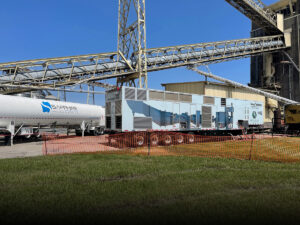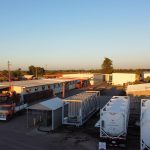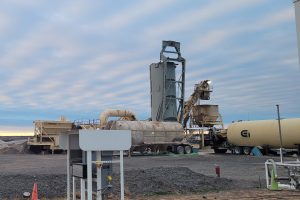Asphalt plant emissions pose significant health risks to people living around them. While asphalt can be used along with concrete to construct roads and parking lots due to its durability, it is potentially harmful if not properly handled. Using hot asphalt can lead to toxic emissions that may cause diseases in people living near the asphalt plants.
One excellent method to solve hot asphalt plant emissions is by building these plants far away from human residences. Workers in such plants need to put on protective gear to keep them safe and reduce their continual exposure to the emissions. Let’s look at a few other possible solutions to the problem of asphalt plant emissions.
[bctt tweet=”Asphalt plants produce potentially dangerous gases if they use the wrong fuel. Here’s how to keep your plant clean. #SapphireNatGas #SapphireGasSolutions” via=”no”]
Understand the Danger of VOCs
Volatile organic compounds (VOCs) are particles of dangerous substances emitted into the air after certain chemical reactions. They vaporize at room temperature, so they stay airborne indefinitely. Asphalt plants emit significant amounts of these gases, and living next to such plants can be hazardous to your health. Other issues associated with overexposure to VOC emissions are:
- Headache or loss of concentration
- Nausea
- Nose, throat, and eyes irritation
- Damage to the kidneys, liver, and lungs
- Dizziness and fatigue
Discover the Natural Gas Difference
Using natural gas rather than fossil fuels to power an asphalt plant is a far safer option. Opponents of natural gas will point out that it produces large amounts of carbon dioxide when burned, but that doesn’t tell the whole story. If used efficiently, natural gas produces mostly carbon dioxide and water vapor when burned, the same primary components of air exhaled by humans. Ironically, burning natural gas may actually be better than letting it leak into the atmosphere. Natural gas is primarily methane, a greenhouse gas much more potent than carbon dioxide, so the chemical change from burning is actually an improvement.
Take Advantage of Virtual Pipeline Access
When you cannot access normal gas supply, virtual pipeline access provides a reliable alternative. With virtual pipeline gas supply, the natural gas is transmitted through a pipeline, dried, chilled, and compressed to 3,600 PSI.
After compression, the gas is loaded into high-tech carbon fiber tubes stored in a trailer. The gas is then transported to the customer, where it will be warmed and decompressed upon arrival to fit the customer’s specific requirements. This ensures you’ll always have a supply of fuel. Additionally, the entire process is carefully monitored to minimize leaks during transport.
Start Reducing Your Asphalt Plant Emissions
Burning any type of fuel will result in some waste materials being produced. However, the type of fuel you choose is critical. A relatively clean-burning fuel like natural gas is a vast improvement over coal or crude oil. To keep your plant running with minimal impact on the surrounding environment, make the switch today!
Contact us to get more information on reducing asphalt plant emissions.




